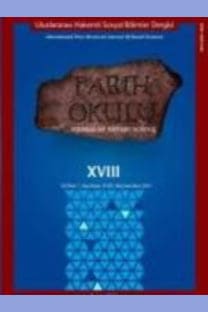Ngugi Wa Thiongo'nun Kan Çiçekleri ve Bir Buğday Tanesi Eserlerindeki Sömürgecilik Sonrası Kadın Figürü
THE FIGURE OF POSTCOLONIAL WOMEN IN NGUGI WA THIONGO'S PETALS OF BLOOD AND A GRAIN OF WHEAT1
___
Affigne, T., 2003. "In the House of the Great White Father: Race and Patriarchy in the Postcolonial world." Conference Papers--American Political Science Association. Annual Meeting, Philadelphia: 1-22. Academic Search Premier.Ashcroft, B. and Griffiths, G. and Tiffin H., 2003. The Post-Colonial Studies Reader, Routledge.
Ashcroft, B. and Griffiths,G. and Tiffin H., 2002. The Empire Writes Back: Theory and Practice in Post-Colonial Literatures, Routledge.
Collective, C. R., 1983. Home Girls: A Black Anthology. Women of Color Press.
Emecheta, B., 1979. The Joys of Motherhood. Oxford, Heinemann Educational Publishers.
Killam, G. D., ed. 1984 Critical Perspectives on Ngugi wa Thiong'o. Washington, DC: Three Continents.
Koopman, J., 1995. "Women in the rural Economy: Past, Present and Future" Hay and Stichter 3-22.
Loomba, A., 1998. Colonialism-Postcolonialism, Routledge.
McLeod, J., 2000. Beginning Postcolonialism, Manchester University Press.
Ogude , A. J., 1997. Ngugi's Concept of History and the Post-Colonial Discourses in
Kenya, Canadian Journal of African Studies / Revue Canadienne des Études Africaines, Vol.31, No. 1, pp. 86-112.
Okunlola, J. B., 1989. "Motherhood As a Metaphor for Creativity in Three African Women's Novels: Flora Nwapa, Rebeka Njau and Bessie Head." In Susheila Nasta ed. Motherlands London, The Women's Press.
Petersen, K. H. and Rutherford A., 1986. A Double Colonization: Colonial and
Post-Colonial Women's Writing. Mundelstrup, Denmark: Dangaroo Press.
Potash, B., 1995. "Women in Changing African Family" Hay and Stichter 69-92.
Schipper, M., 1998. Emerging from Shadows: Changing patterns in Gender Matter.
Thiong'o, W.N., 1975. Secret Lives, and Other Stories. London: Heinemann, Print.
Langson Library: PR9381.9.N42 .S4
-------- 1991. Petals of Blood, Penguin Books.
---------2002. A Grain of Wheat, Penguin Books.
--------1986.Decolonizinq the Mind: The Politics of Language in African Literature. London: James Currey.
--------1981. Writers in Politics. London: Heinemann.
-------- 2000. Europhonism, Universities, and the Magic Fountain: The Future of
African Literature and Scholarship, Research in African Literatures, Vol. 31, No. 1, pp. 1-11.
-------- 2012. Theory and The Politics of Knowing, Columbia University Press, New York.
Waruhiu, R., 1995. What do African Women Want?. In Georgia Ashworth, ed. A Diplomacy of the Opressed. London, Zed Books.
Young, R.J.C., 2003. Postcolonialism: A Very Short Introduction. New York: Oxford University Press.
Young, R., 2004. White Mythologies: Writing History and the West, Routledge.
- ISSN: 1308-5298
- Yayın Aralığı: 6
- Başlangıç: 2008
- Yayıncı: Ahmet KARA
BİR AKTÖR, BİR MÜVERRİH: KÖPRÜLÜ VE İNALCIK'IN CUMHURİYET TÜRKİYE'SİNE BAKIŞI
Ekonomide Bireysellik Hikayesinin Anlatıcısı Kimdi: Mandeville mi yoksa Smith mi?
HEYKELTIRAŞ BURHAN ALKAR'IN ANIT ESERLERİNİN TASARIMI VE KAMUSAL ALAN İLE İLİŞKİLERİ
Ümit Niyazi ÖZCAN, Relations With Public AREA
MA'LÛMÂT-İ İBTİDÂİYYE VE NESÂYİH-İ NÂFİA KİTABININ ÇEŞİTLİ AÇILARDAN İNCELENMESİ
Kemal Zeki ZORBAZ, HÜSEYİN ÖZÇAKMAK
TÜRKİYE VE İRAN: İSTİKRARLI BİR İLİŞKİNİN SINIRLARI
Mustafa ALİCAN, John CALABRESE
KARADENİZ'DE OSMANLI HÂKİMİYETİ VE RUSYA'NIN SICAK DENİZLERE İNME MÜCADELESİ
